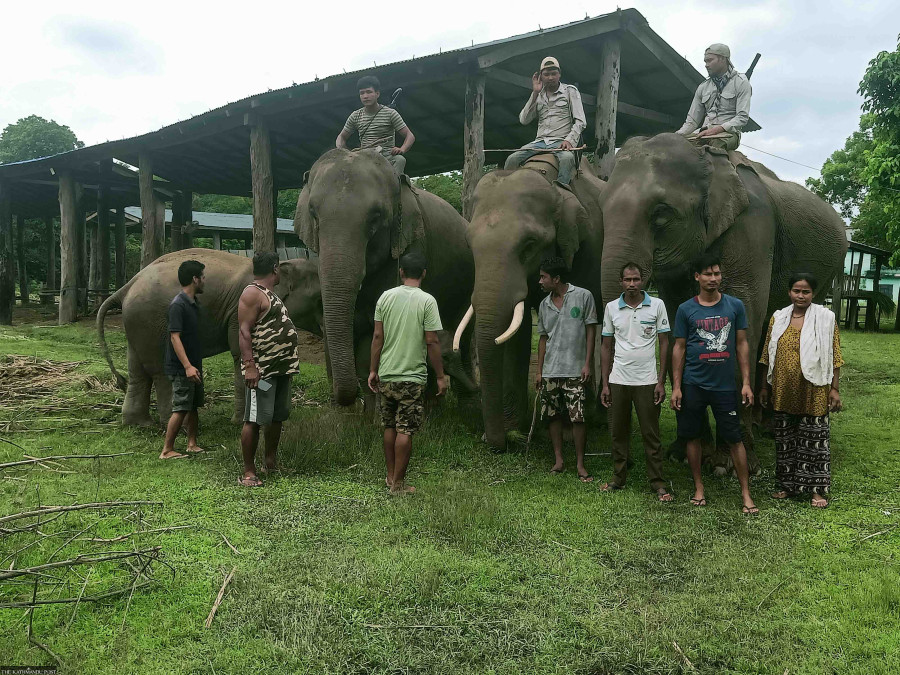Money
Mahouts take a hazardous job in their stride
‘We might get attacked by wild elephants or our elephants might get stuck in the mud’, says a mahout.
Bhawani Bhatta
Maan Puran Sunaha grew up in the vicinity of Shuklaphanta National Park in western Nepal, and has had a close relationship with elephants since childhood.
His father was a mahout, an elephant rider at the national park, and he often took him to the elephant camp. “I used to visit the camps frequently,” he said.
Sunaha, now 33, is a mahout himself. He was hired by the national park six years ago, and looks after an elephant named Narayan Prasad.
“In the beginning, it was difficult handling the jumbos. Now I have become more familiar with their nature, and the job has become easier,” he said.
Sunaha’s job is a risky one. Elephants are usually gentle, but sometimes they can get angry; and when they get angry, they can throw the mahout off their back.
Sometimes the elephant is not ready to return to camp from a walk in the forest, and it can attack the mahout if he is too insistent. The risk is greater during the rainy season.
Taula Rana of Bhimdatta Municipality-14 which adjoins the national park has been with elephants since his childhood days.
“I was fascinated by the way the mahout controlled the elephants. These massive beasts used to roam around our village. So I also wanted to be a mahout,” said Rana.
For the past 10 years, he has been taking care of an elephant named Narayan Kali at the national park's elephant camp.
Pratap Rana of Dhangadhi used to be afraid of elephants as a child, and he never went near them. Eight years ago, a relative told him about a job opening for a mahout at the national park.
“I was a bit hesitant in the beginning because the job requires courage,” said Rana.
But he needed the money, and took the job. Rana is now the head mahout at the camp.
A mahout keeps his job for a lifetime, and it is usually passed down from father to son. The son enters the hereditary profession after a long apprenticeship.
Mahouts don't want their sons to follow them because they know how hazardous the work is. But jobs are scarce, and the sons end up doing what their fathers and grandfathers and generations before them have been doing.
A day in the life of a mahout starts early. They clean the camps first thing in the morning. Then they go to the forest to collect fodder.
They return at 9 am and take the elephants for a walk in the forest after feeding them.
Back at the camp in the evening, the mahouts prepare food for the elephants, which is paddy, jaggery and salt wrapped in straw to form a packet.
Each elephant is given 15 kg of paddy, a half kg of jaggery and 25 grams of salt.
According to the mahouts, their duty starts at 4 in the morning and lasts till 10 at night.
“We need to spend the entire day looking after the elephants. The job is filled with risks,” said Pratap Rana.
“It is more dangerous when we take the elephants for a walk in the forest. We might get attacked by wild elephants or our elephants might get stuck in the mud.”
Ugrasen Rana of Beldandi Rural Municipality started as a cook at the national park. He learned to handle elephants and became a mahout.
Rana used to look after a blind elephant named Sharada Kali. She died two years ago, and he was assigned to look after Narayan Prasad.
Usfal Rai of Tikuliya in Mahottari—around 786 km east of Shuklaphanta National Park—has been training to be a mahout for a year.
“I have been learning the skills to handle elephants,” said the 19-year-old Rai.
Bimala Chaudhary of Jonapur in Shuklaphanta Municipality is the only female mahout in the national park.
Chaudhary learnt the skills from her elder brother Chandra Chaudhary who is also a mahout at the national park.
“At first, I rode elephants for fun, now it has become my job as I have no other sources of income,” said Chaudhary, who looks after a two-year-old calf named Shesh Chandra Gajraj.
Shesh Chandra Gajraj was born to Narayan Kali who had been brought to Shuklaphanta National Park from Chitwan National Park two years ago.
Two weeks ago, she gave birth to a calf who was named Shukla Kali.
“The job of a mahout is challenging, and being the sole female mahout makes it even more challenging,” said Chaudhary.
She added that taking the elephants for a walk in the forest alone was the most difficult part of her job.
“But I am up to it,” said the mother of a seven-year-old son.
Chaudhary’s husband Gopal is currently studying forest science. She’s paying for the education of both her husband and son with the money she earns as a mahout.
There are six elephants at Shuklaphanta National Park, among whom three are at Piparaiya camp, two at Shuklaphanta camp and one at Malubela camp.
Three employees are assigned to look after each elephant.




 13.12°C Kathmandu
13.12°C Kathmandu













